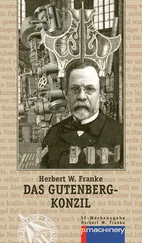He’d never set foot in the place before. It was a fetid den, his uncle said, where Archbishop Dietrich’s priests and abbots schemed — as much despised by guildsmen as the Elders’ tavern at the Tiergarten. The higher-ranking canons of the different orders stopped there when they passed through Mainz, en route from Rome or Aschaffenburg, the Hessian city where Dietrich had his court. Most of them also held high posts in the archbishop’s vast administration or the pope’s, along with parishes they scarcely ever darkened. The Schreibhaus had become a trading hall, except that they no longer bartered manuscripts, wine, and wheat, but pulpits, favors, sinecures, and prebends.
The place was dim and stank of rancid food and wine. For an instant Peter mistook all those shrouded forms for sheep: fat woolen humps of black and brown, all lowing underneath dark rafters. Then the room resolved into the black of Benedictines and Augustinians, the brown of Franciscan friars, here and there a white Cistercian lamb. Off to the right, the priests of the cathedral chapter sat like folded exclamations, sharp and black, a band of white at every throat. Peter walked with purpose toward a half door at the back. A silver heller bought a cup out of a monastery cask. He turned, surveyed the room, and wished that he could stopper up his nose. Otherworldly scents mixed with the sweat wrung from the fabric of those unwashed robes: the chalk of cloisters, the bite of oak gall, the aftertaste of thin communion wine.
The faces were all known to him — in the way that any face, in a place as small as Mainz, was known. They didn’t change: the jowls just spread, the noses grew redder and more bulbous. Elders all, patricians from the city or the minor nobles from the land: the clergy was made up of second sons from wealthy families, stashed and suckled by the Mother Church for life. It was amusing to him how their eyes slid over him and then went back to their own business. He had been gone for long enough for his own face to change. He was a stranger, with a stranger’s anonymity, which brought both freedom and a certain risk.
He feigned a spark of recognition and advanced across the room. He did not know what he would do if he fetched up empty-handed at the far wall. He wove around the brothers at their stools and tables, said a prayer when he was spared: a glance, a sandy head in a dark cowl, a low familiar drawl.
“Petrus Opilionus! Do I see right?” The puffy face of Petrus Heilant cracked in a wide smile.
“Your eyes are fine.” Peter could not help but smile as broadly in return, so sweet was it to hear his Latin name. “Peter Shepherd,” Peter Schoeffer had been called.
Heilant stood and embraced him, then looked him over with heavy-lidded eyes. He wore the black St. Viktor’s robe and stood just to Peter’s shoulder, as short and stocky as a well-fed goat. “Good Lord, it’s been an age.” There was a laugh on his full lips. “Where have you got yourself to? Look at you, a proper scribe.”
Two acolytes were sitting at his table wearing white probationary shifts. “Eberhard, Lubertus,” Heilant said. “An old schoolmate, Peter Schoeffer, pen divine.”
“You seem to be the one who’s blessed,” Peter whispered in his ear. “I can’t believe you took your vows.”
Heilant shrugged and smiled; there’d always been a cunning spark hid well beneath that puffy, hibernating look. “I work, I write.” He flipped the rope ends girdling his full waist. “In penitence and patience, waiting for the Lord’s reward.” He tilted his fair head and smirked: “And once a week, I’m paid to take confession from the sisters.”
“At St. Viktor’s?”
“The Altmünster.” His old friend winked. “A little something on the side, to keep myself in drink.”
“I always knew that you’d go far.” Peter laughed, swung his cloak onto the chair, and raised his cup to toast his luck. If any man could get him out of Mainz, that man was Petrus Heilant. He’d never seen much point in aiming low. His name alone explained it: Petrus Heilant von Erbach had been born to wealth, and born to climb. The level of his scholarship was average, and as scribe he had a slapdash style, but he had never shown the slightest doubt that he would rise. He hailed from lands along the river Main, just like his distant kinsman, Archbishop Dietrich, Schenk von Erbach.
They fell to reminiscing, probing the whereabouts of others whom they had studied with. The pimpled youths sat silent for a while, then started making mewling noises: curfew, prior, the long hike. Heilant rolled his eyes as they retreated. “At their age we’d have nursed a drink for hours in hopes of picking up some useful gossip.”
“You, maybe.” Peter laughed.
“You always did think you could make it without dirtying your hands.” Heilant smiled archly.
Lies, all lies, thought Peter Schoeffer. Everything had always come from Fust. He felt, and pushed away, a little needling of guilt inside. “In youth,” he quoted with a bitter laugh, “I saw as through a glass, but darkly.”
“The truth is, you have to make your own way in this world.” Heilant screwed his eyes up, looked intently at the tables at the far end of the room.
“Amen,” said Peter.
“It’s all in who you know.” A little gleam — ambition, and alertness — glimmered in those sleepy yet dissembling eyes. Heilant cocked his head and pitched his voice low. “See those two priests? That’s Volprecht Desch. And Greifenklau.” He singled out the two in habits of the Mainz cathedral. “And back behind that screen”—a heavy hanging, cutting off an alcove—“the men you really need to know: Quelder, Konneke, von Isenberg. A clerk for Rosenberg.”
The names meant nothing to him, except for the last. “Hermann Rosenberg?” he asked, and Heilant nodded. The vicar general of the Mainz archdiocese, personal confessor to Archbishop Dietrich himself: they’d seen him years ago, officiating at some function at the university.
“This is the place, then,” Peter said softly.
It seemed a stroke of the most unimaginable luck, to be connected with so consummate a climber. The names that Heilant whispered with such awe were not just canon regulars at St. Viktor’s, but men who also held the leading posts in the archdiocese, each with its tidy income every annum. A deacon or a cantor might wear two hats, even three: clerk to the archbishop, envoy to some noble, priest to several parishes, officiant in any of the city’s forty churches. The clergy were all Elders, and the Elders were the clergy; one hand ceaselessly washed the other. That trafficking might once have made Peter sick, but he relished all those contacts now.
“You’d know, then,” Peter said, keeping his voice low, “if any of those chancelleries require a scribe.”
Heilant cocked his head, eyes bright. “I wondered why you graced us with your presence after all this time.”
“You knew I was in Mainz?”
“I know a lot of things.” His schoolmate smiled.
“I need your help. My father dragged me back — you knew I was in Paris, too?” Heilant nodded. “I was about to join the rector’s staff at the Sorbonne.” Peter did not fake the grimace. “He’s forced me into some harebrained scheme to crank out books.”
“Crank out?”
“I can’t say more.”
Heilant’s eyes went wicked, and he licked his lips. “With wood? I’ve seen that tripe.” He flicked his plump right hand. “Carpenters,” he scoffed. “The stuff they chisel isn’t any better than the junk that Lauber and his ilk churn out.”
“Just as I see it. They seem to think they can replace real scribes.” Peter bent close. “I hoped that I might find a post where skills like ours are better valued. But no one — I mean no one — is to know.”
Читать дальше












